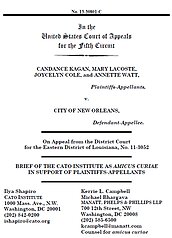Kagan v. New Orleans
Learn more about Cato’s Amicus Briefs Program.
For the second time this fall, Cato has filed a brief supporting a lawsuit challenging the power of cities to stifle and regulate speech by licensing tour guides—effectively restricting who may lawfully speak to an audience about the city’s history. In September, we filed a brief supporting “Segs in the City,” a segway touring company challenging a D.C. law which made it illegal to give tours in Washington, D.C., without completing a licensing process that involves a thorough history exam. Now we’ve filed a brief in the U.S. Court of Appeals for the Fifth Circuit, again joined by First Amendment expert Prof. Eugene Volokh, in support of a group of tour guides challenging New Orleans’ licensing scheme. (Both the D.C. and New Orleans guides are represented by our friends at the Institute for Justice.) Like D.C., New Orleans only licenses guides who can pass a history test. In addition to that blatantly unconstitutional speech restriction, the Big Easy also requires licensees to submit to periodic drug tests. All that just so they can talk about the history and culture of New Orleans without spending five months in prison! We argue that the licensing regime is a content-based restraint on speech and therefore must pass the strictest judicial scrutiny, so the government needs a compelling reason for it and has no other way of accomplishing the same goal. The law is a content-based speech regulation in that it is (a) triggered by the content of speech, and (b) justified on the basis of the content that it regulates. The Supreme Court has repeatedly held that a law regulating the content of speech—as opposed to its location, timing, or manner—is subject to strict scrutiny. The justifications offered for the licensing law refer to the “sufficient knowledge” of the guides and the accuracy of their speech. That is as much a content-based justification as saying that people need to be protected from hearing “erroneous” political opinions or “controversial” historical theories. Finally, we argue that tour guides are not members of a “profession,” such as lawyers, doctors, and accountants, which could merit less First Amendment protection in order to protect the public from harm. Unlike those professions, tour guides don’t have intimate relations with clients. Instead, like most businesses, they simply have customers. The government can’t possibly require authors, public lecturers, or documentary filmmakers to get licensed in order to protect the public from “misinformation,” and it has no more basis for licensing tour guides.
